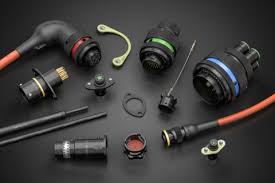What Are the Common Failure Modes of High-Performance Connectors?
admin
- 0
Failure Modes of High-Performance Connectors
High-performance connectors are used in a wide range of applications and must be capable of withstanding a variety of environmental and mechanical stresses. Understanding the common failure modes of these types of connectors can help prevent and troubleshoot problems more effectively. Some of the most common failures include contact loss, mechanical stress, environmental factors, and electrical overload. By taking precautionary measures to ensure proper installation and maintenance, you can reduce the risk of these failures and avoid costly downtime.
One of the most common causes of failure for High Performance Connector is electrical contact loss. This can occur when a pin is broken off or loses its ability to make contact with another pin, resulting in unwanted electrical leakage or short circuiting.

Typically, the contacts in high-performance connectors are either crimped or soldered to wires, and the mating ends of those contacts lock into the mating surfaces of the connector inserts. In some types of connectors, the inserts themselves have a soft rubber seal that prevents moisture from flowing from the back of the insert to the contact mating surfaces.
What Are the Common Failure Modes of High-Performance Connectors?
Harsh operating environments, such as exposure to extreme temperatures, humidity, and dust, can corrode the contacts and compromise the integrity of the insulation material in a connector. Over time, this can cause a reduction in conductor surface area and increase the risk of contact failures.
Connectors are susceptible to a variety of mechanical stresses that can lead to early failure, such as excessive vibration or strain, improper mating and unmating, or misalignment. These stresses can dislodge contacts, damage the insulating material, or crack the shell, leading to unwanted electrical leakage and short circuits.
Improper installation practices can also lead to mechanical stress on connectors. For example, using improper installation tools can cause a lack of mating force or over-tightening of connector screws, causing misalignment and potentially reducing the lifespan of the connectors. Following manufacturer guidelines and ensuring that installation procedures are followed correctly can help mitigate this issue.
Lastly, exposing connectors to a high amount of mechanical stress over a long period of time can lead to fatigue failure. This is when the insulating material or cable leads degrades due to the repetitive cycles of current flow and thermal expansion and contraction.
A common method to identify and predict potential problems in connectors is bent pin analysis. In this process, an analyst uses a scaled drawing of a connector and its pins to determine the possible failure modes. The analyst then considers each pin, one at a time, and determines whether that pin can touch a neighboring pin if bent and, if so, how far it can reach. This is a subjective process, however, and results may vary depending on the individual’s judgment. For example, a pin that is bent but does not directly touch any other pins (or the shell) is not considered a failure mode, and would be ignored in the FMEA worksheet.
Jinftry (JING FU CAI (HONGKONG) INTERNATIONAL CO., LIMITED) is a global professional one-stop procurement and service provider of electronic components. It uses independent distribution, platform distribution combined with the Internet online sales model to sell various products worldwide. Types of electronic components, providing one-stop component procurement and supply chain services to global OEM factory customers and brokers. Sales include integrated circuits, discrete semiconductors, IGBT modules, connectors, capacitors, diodes, transistors and other electronic components, covering power supply, automotive, communications, computers, consumer products, medical, industrial, mobile phone and other application fields.
Jinftry product line cards: TI, ONSEMI, Microchip, Maxim, NXP, STM, Xilinx, Intel, Infineon, Broadcom, Renesas, samtec, Souriau, CISSOID, Mitsubishi, FUJI, Semikron, etc.

Website: https://www.jinftry.com
Shenzhen Operation Center Address: 26F1, Building C, Electronic Technology Building, Shennan Middle Road, Futian District, Shenzhen, Guangdong, China
Hong Kong company name: JING FU CAI (HONGKONG) INTERNATIONAL CO., LIMITED
Registered address of Hong Kong company: Unit No.A222,3F,Hang Fung Industrial Building,Phase2,No.2G Hok Yuen Street,Hunghom,Kowloon,Hong Kong
Email: [email protected]
Tel: +86-755-82518276
